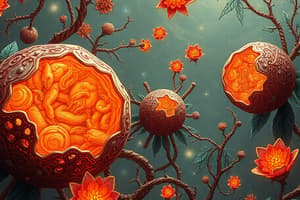Podcast
Questions and Answers
What role do lysosomes play in cellular health?
What role do lysosomes play in cellular health?
- They degrade materials using hydrolases. (correct)
- They synthesize proteins for the cell.
- They store genetic material.
- They produce energy for cellular functions.
What is the primary consequence when the autophagy process is altered?
What is the primary consequence when the autophagy process is altered?
- Increased energy production in the cell.
- Accumulation of damaged proteins and organelles. (correct)
- Enhanced immune response.
- Increased synthesis of new cellular components.
During which process do phagocytes incorporate external materials into a structure that eventually fuses with lysosomes?
During which process do phagocytes incorporate external materials into a structure that eventually fuses with lysosomes?
- Autophagy
- Endocytosis
- Phagocytosis (correct)
- Exocytosis
What triggers the degradation of proteins in the proteasome?
What triggers the degradation of proteins in the proteasome?
What type of cellular damage results from the accumulation of altered proteins in the endoplasmic reticulum?
What type of cellular damage results from the accumulation of altered proteins in the endoplasmic reticulum?
Which of the following statements best describes heterophagy?
Which of the following statements best describes heterophagy?
What is formed when a phagosome fuses with a lysosome?
What is formed when a phagosome fuses with a lysosome?
Which of the following diseases is characterized by altered autophagy?
Which of the following diseases is characterized by altered autophagy?
What role does the p53 protein play in cellular processes when DNA damage occurs?
What role does the p53 protein play in cellular processes when DNA damage occurs?
What happens to p53 activation when the TP53 gene is mutated?
What happens to p53 activation when the TP53 gene is mutated?
What is the consequence of a continuously activated transducer molecule in cells?
What is the consequence of a continuously activated transducer molecule in cells?
Which condition can lead to the activation of p53?
Which condition can lead to the activation of p53?
What is the function of p53 when DNA damage cannot be repaired?
What is the function of p53 when DNA damage cannot be repaired?
Which of the following describes a function of the p53 protein during oxidative stress?
Which of the following describes a function of the p53 protein during oxidative stress?
What role does the TP53 gene play in tumor suppression?
What role does the TP53 gene play in tumor suppression?
What is a primary characteristic of oncosuppressor genes?
What is a primary characteristic of oncosuppressor genes?
What is one of the main consequences of ROS production in cells?
What is one of the main consequences of ROS production in cells?
Which of the following conditions can lead to increased ROS production?
Which of the following conditions can lead to increased ROS production?
What role does superoxide dismutase (SOD) play in ROS management?
What role does superoxide dismutase (SOD) play in ROS management?
What is the significance of the Haber-Weiss reaction in ROS production?
What is the significance of the Haber-Weiss reaction in ROS production?
Which enzyme is responsible for the degradation of hydrogen peroxide in cells?
Which enzyme is responsible for the degradation of hydrogen peroxide in cells?
What function does xanthine oxidase serve related to ROS?
What function does xanthine oxidase serve related to ROS?
Which of the following is a potential environmental source that can increase ROS production?
Which of the following is a potential environmental source that can increase ROS production?
What effect does superoxide have on normal tissues during its production?
What effect does superoxide have on normal tissues during its production?
What is the primary function of memory lymphocytes?
What is the primary function of memory lymphocytes?
How do activated immune cells typically behave in comparison to naive and memory cells?
How do activated immune cells typically behave in comparison to naive and memory cells?
Which of the following is a characteristic of cytokines in the immune system?
Which of the following is a characteristic of cytokines in the immune system?
What role do chemokines play in the immune system?
What role do chemokines play in the immune system?
Which type of membrane receptors can be specific to proteins involved in phagocytosis?
Which type of membrane receptors can be specific to proteins involved in phagocytosis?
What is the primary role of growth factors in the immune system?
What is the primary role of growth factors in the immune system?
Polymolecular soluble systems include which of the following?
Polymolecular soluble systems include which of the following?
Which of the following best describes naive cells in the immune system?
Which of the following best describes naive cells in the immune system?
What type of macrophages are found in the liver?
What type of macrophages are found in the liver?
Which cells are considered professional phagocytes?
Which cells are considered professional phagocytes?
From where do adult macrophages mainly derive?
From where do adult macrophages mainly derive?
What is the lifespan of neutrophils?
What is the lifespan of neutrophils?
In which organ do T-cells mature?
In which organ do T-cells mature?
How do macrophages produce reactive oxygen species (ROS) compared to neutrophils?
How do macrophages produce reactive oxygen species (ROS) compared to neutrophils?
What is the primary role of dendritic cells?
What is the primary role of dendritic cells?
During fetal life, dendritic cells originate from which type of precursor?
During fetal life, dendritic cells originate from which type of precursor?
Flashcards are hidden until you start studying
Study Notes
Health and Disease
- Health, according to WHO, is defined as a state of complete physical, mental, and social well-being, not just the absence of disease.
- Cells play a crucial role in health and disease development; molecular alterations can lead to organelle damage and dysfunctional cell functions.
Lysosomes
- Lysosomes are membrane-bound vesicles rich in hydrolase enzymes like proteases and lipases, critical for digesting materials within cells.
- They digest external materials via endocytosis and are involved in phagocytosis through phagocytes, leading to the formation of phagolysosomes.
Autophagy and Proteasome Functions
- Autophagy allows cells to degrade their own proteins or organelles, particularly those that are damaged or aging, to recycle materials for new molecule production or disposal.
- Proteasomes degrade denatured proteins, especially under stress conditions, playing a vital role in antigen presentation via MHC class 1 molecules.
Cellular Damage and Reactive Oxygen Species (ROS)
- Exposure to environmental factors, like UV or certain metals, can enhance ROS production, leading to cellular injury and potentially contributing to aging and tumorigenesis.
- ROS can cause necrosis or apoptosis, resulting from mitochondrial respiration or specific enzymatic reactions.
Superoxide and ROS Regulation
- Superoxide is generated during infections or mitochondrial respiration and can damage tissues; it is neutralized by superoxide dismutase (SOD) and catalase.
- SOD catalyzes the conversion of superoxide to less harmful hydrogen peroxide, which can be further degraded by catalase into water and oxygen.
Cell Proliferation Signaling
- Certain molecules can continuously signal from the membrane to the nucleus, leading to cell proliferation even in normal growth factor concentrations.
- Oncosuppressor genes, like TP53, play a critical role in regulating the cell cycle and preventing tumor formation through DNA damage response mechanisms.
p53 and Its Role
- p53, known as the "genome guardian," orchestrates cell cycle arrest or apoptosis upon DNA damage, preventing the propagation of mutations.
- It is activated by conditions such as hypoxia, oxidative stress, and telomere shortening, influencing cell fate decisions.
Macrophages and Neutrophils
- Macrophages and neutrophils are key phagocytic cells, with neutrophils having a short lifespan and rapid responses while macrophages are longer-lived and produce high levels of cytokines.
- Macrophages develop from monocytes, with various specialized forms residing in different tissues (e.g., Kupffer cells in the liver).
Lymphocyte Maturation and Function
- B-cells mature in the bone marrow, while T-cells require maturation in the thymus before becoming memory cells that recirculate and mount a rapid immune response upon reinfection.
- Activated lymphocytes migrate to inflamed tissues to fight infections and produce antibodies and cytokines.
Immune System Molecules
- Immune functions are mediated by membrane receptors (specific and non-specific) and soluble molecules like cytokines, which are critical during both normal and inflammatory conditions.
- Chemokines attract immune cells to infection sites, and growth factors are essential for lymphocyte proliferation and differentiation.
Inflammation and Immune Response
- Cytokines and chemokines orchestrate the immune response, facilitating the movement of immune cells to sites of infection or injury.
- The immune system relies on various molecules to maintain homeostasis and react effectively to pathogens, ensuring proper immune function.
Studying That Suits You
Use AI to generate personalized quizzes and flashcards to suit your learning preferences.




